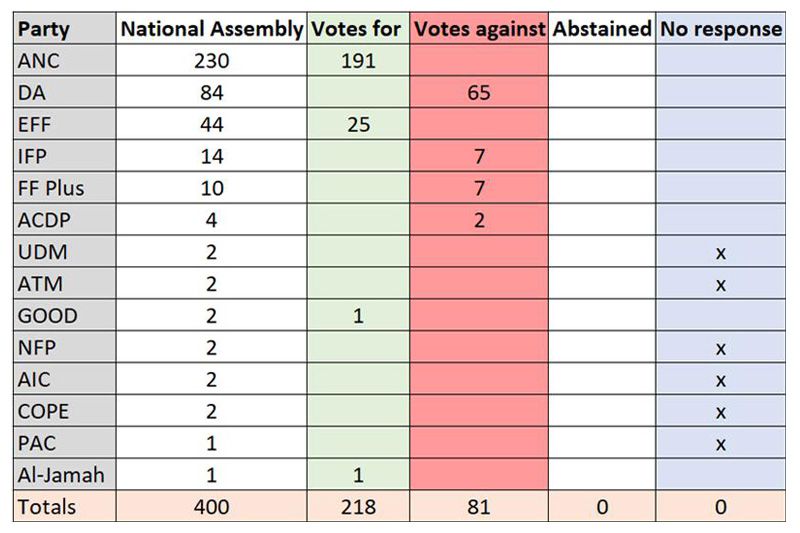.Image: Flickr/GovZA
Electoral reform bill: Will the President sign it?
The Electoral Amendment Bill is on the President’s desk for signature. It does not provide the broader electoral reform OUTA wanted, as it allows independent candidates to stand in national and provincial elections but is still skewed against them. We now wait to see if the President will sign it into law.
The National Assembly (NA) passed the bill on Thursday 23 February 2023 (see here), after the National Council of Provinces amended it and returned it to the NA for finalisation. A total of 299 of the 400 MPs voted on the bill, 218 for it and 81 against.
Rachel Fischer, OUTA’s Parliamentary Engagement and Research Manager, has been watching the progress of the bill and submitting OUTA’s criticisms of the bill to Parliament.
“There wasn’t consensus. Many parties disagreed, such as the DA and the IFP,” says Fischer, but the bill was passed. The votes in favour of the bill were led by the ANC.
One part of the bill that there was agreement on was the establishment of an electoral reform consultation panel. “This is a good thing, because this panel will address some the concerns that the current bill is raising, especially in light of the 2024 elections. However, there are some reservations about this panel, since it effectively will duplicate the work that has already been done by the Ministerial Advisory Committee,” says Fischer. The committee was established in 2021 and delivered its report the same year.
OUTA supports electoral reform which allows independent candidates to stand in national and provincial elections. We believe that independents will be more answerable to their voters as they face the real prospect of being voted out if they fail to deliver on election promises, whereas those linked to parties are beholden to their parties.
The final bill allows independent candidates but is still loaded against them in favour of parties. Independents must obtain signatures from about 15% of the voters required to win a seat (about 6 300 signatures) before they can stand; although this has been reduced from 20% (about 8 400 signatures) this is still a high bar for candidates to meet.
The bill now goes to the President for signature, which is due to be done in time to meet the Constitutional Court’s second extended deadline for amending the law on Tuesday 28 February. The Concourt declared the Electoral Act unconstitutional in June 2020 because it did not allow independent candidates but suspended the declaration of invalidity for two years to give Parliament time to update the law. Parliament delayed processing the amendment, asked for two deadline extensions, and has tried to limit the reform to the minimum.
The issue now is whether the President signs the bill into law or rejects it. There are possibilities of legal challenges by civil society to the law due to the controversial issues in it, but these would have to wait for the President’s decision on signing the bill.
“If he rejects the bill or misses the deadline, the current Electoral Act will be invalid and this has its own constitutional implications,” says Fischer. “We have to wait and see what is going to happen on 28 February.”
Fischer says the status of the 2024 national and provincial elections still hangs in the balance. The Electoral Commission needs sufficient time to prepare for the elections. Whether there will be independent candidates, the calculations for votes and seats, and what will happen with wasted votes are crucial in this planning.
“Interesting times are lying ahead and we are looking forward to what is going to happen,” says Fischer.
More information
An OUTA podcast commenting on the passing of the bill with OUTA’s Rachel Fischer is here.
Read more about OUTA’s work on electoral reform here.
OUTA urges citizens to register to vote and then to vote in the 2024 elections: Be the Boss, Be the Change.
Below: How the MPs voted on the Electoral Amendment Bill

Help us oppose corruption
OUTA is standing up against government corruption and mismanagement.
Our work is made possible though donations by our paying supporters.
Join us in working towards a better South Africa by becoming a paying OUTA supporter.
In 2022, we’re in court challenging the AARTO law, the Karpowership generation licences and SANRAL’s secrecy over toll profits.
We’re also challenging electricity prices and defending South Africa’s water resources.
We want to see South Africa’s tax revenue used for the benefit of all, not a greedy few.
Any amount welcome.